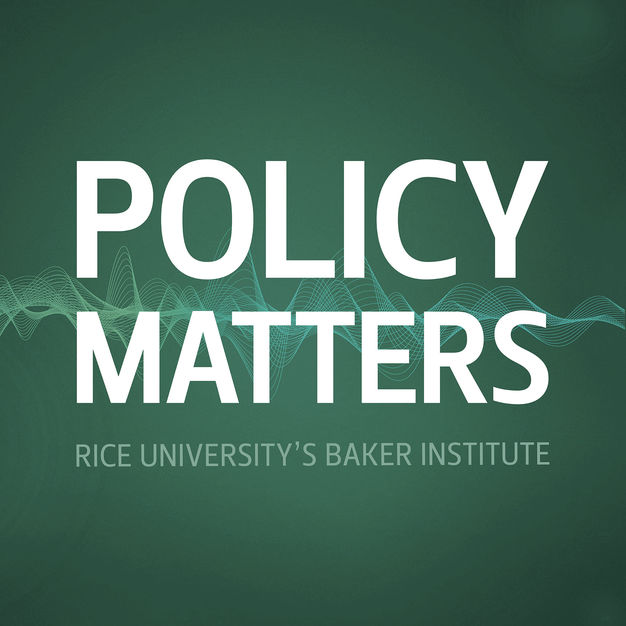
Policy Matters
Rice University's Baker Institute
Policy ideas and perspectives from Rice University’s Baker Institute for Public Policy – one of the nation’s leading think tanks.
- 13 minutes 53 secondsWhy Did Consumer Credit Scores Go Up during the Covid-19 Pandemic?
The Covid-19 pandemic caused huge economic disruption for millions of Americans. Unemployment rose sharply. Many businesses – especially small ones – struggled to stay open. Yet consumer credit scores actually increased during the course of the pandemic. What explains this surprising result? What role did reduced household consumption play? How did government programs impact credit scores? And what will happen as the pandemic eases – and, with it, government relief measures?
This episode’s guest is Dr. Joyce Beebe, Fellow in Public Finance at the Baker Institute and an expert on taxation. She has recently published an issue brief titled “The Curious Case of High Consumer Credit Scores.” It is available on the Baker Institute website.
26 May 2021, 12:00 pm - 9 minutes 24 secondsWhat Does the Mexico City Subway Disaster Tell Us about Infrastructure in Mexico?
On May 3, a subway collapse in Mexico City killed 26 people and injured scores of others. The collapse is a heart-breaking human tragedy. But it also raises important questions about Mexico’s approach to infrastructure. What does this disaster tell us about what could be called the culture of maintenance in Mexico? How is it related to budgetary austerity? Is corruption part of the problem? Will the disaster have an impact on upcoming mid-term elections in Mexico?
This episode’s guest is Rodrigo Montes de Oca. He is a research scholar at the Baker Institute Center for the United States and Mexico, with a focus on the rule of law and corruption in Mexico. Montes de Oca is the author of a recent piece on the Mexico City subway collapse. It is available at the Baker Institute website.
20 May 2021, 12:00 pm - 13 minutes 36 secondsHow to Understand the U.S. Withdrawal from Afghanistan
In mid-April, President Joe Biden announced that there would be a full withdrawal of U.S. forces from Afghanistan by the symbolic date of September 11, 2021—twenty years after the 9/11 terror attacks. Though troop numbers in Afghanistan have declined in recent years, a complete withdrawal of the type described by Biden would be a notable new development in U.S. military strategy. What is the background behind this decision, and how has it been received in D.C.? How should we contextualize Biden’s pronouncement within the broader history of American foreign policymaking?
This episode’s guest is Joe Barnes, the Bonner Means Baker Fellow at the institute and regular Policy Matters host. As an expert and seasoned commentator on U.S. foreign policy, Joe shares his timely perspective on the questions surrounding the U.S. withdrawal from Afghanistan.
5 May 2021, 12:00 pm - 12 minutes 35 secondsIs There a Migrant Crisis at the Border?
Growing numbers of undocumented migrants crossing the Mexico-U.S. border have raised a political firestorm in the United States, with some – particularly Republicans – calling the situation a “crisis.” Polling suggests that handling migration may be a weak spot in President Biden’s otherwise popular agenda. What are the numbers when it comes to undocumented crossings at our southern border? How is Biden’s approach different from Trump’s? Why is immigration reform so difficult in the United States? This episode has two guests. The first is Dr. Tony Payan, the Francoise and Edward Djerejian Fellow for Mexico Studies and Director of the Center for the United States and Mexico at the Baker Institute. The second is Ms. Pamela Lizette Cruz. She is a Research Analyst at the Center. Their work on U.S.-Mexican border issues and immigration can be found on the Baker Institute website.
15 April 2021, 12:00 pm - 17 minutes“Assessing the Crisis in Yemen: Six Years On”
For the past six years, Yemen has been the center of a heated armed conflict between its Saudi and UAE-backed government and the rebel group “Ansar Allah,” more commonly known as the Houthis, leading to countless deaths and internally displaced persons. On top of the global challenge of the Covid-19 pandemic, Yemenis are continuing to face dire health crises exacerbated by the war, causing what is widely regarded as the world’s worst humanitarian crisis. In the wake of a recent ceasefire proposal by Saudi Arabia, what is the current state of the conflict in Yemen? What are the broader geopolitical dynamics at play between neighboring powers that are fueling this war, and how is the Biden administration approaching this enduring foreign policy issue?
This episode’s guest is Dr. Kristian Coates Ulrichsen, a Fellow in the Baker Institute’s Center for the Middle East. He is a top expert on the geopolitics of the Persian Gulf region who has recently published a number of policy analyses on the conflict in Yemen and other pressing foreign policy questions, all of which are available on the Baker Institute website.
31 March 2021, 12:00 pm - 14 minutes 13 secondsWhat Should the Biden Administration Do about U.S. Drug Policy?
“The times they are a’changing,” however slowly, when it comes to drug policy in the United States. Across the nation, states and municipalities are reassessing often punitive laws governing the use of illicit substances. What has been the human cost of the “war on drugs?” How has it impacted disadvantaged communities? What has been the effect of the Covid-19 pandemic on drug use? And what steps should the new Biden Administration do to help foster a more humane and just approach to drug use? This episode has two guests. The first is Dr. Katharine Neill Harris, the Alfred C. Glassell, III, Fellow in Drug Policy here at the Institute. On March 11, Dr. Neill Harris testified about federal drug policy before the U.S. House Judiciary Committee. The second guest is Dr. William Martin, the Harry and Hazel Chavanne Senior Fellow in Religion and Public Policy and Director of the Institute’s Drug Policy Program. Dr. Harris and Dr. Martin have recently co-authored a policy brief titled “Drug Policy Priority Issues for the Biden Administration.” It is available on the Baker Institute website.
24 March 2021, 12:00 pm - 18 minutes 13 secondsThe February Electrical Power Disaster in Texas: What Can Be Done to Avoid a Repeat
In mid-February, a cold weather storm swept much of the United States. In Texas, the result was catastrophic, as skyrocketing electrical demand and plummeting supply led to massive, protracted blackouts across the state. The Electric Reliability Council of Texas (ERCOT), which operates most of the state’s electrical grid, has received an avalanche of criticism. What is ERCOT? What factors led to the mid-February blackouts? What can ERCOT and the state of Texas do to avoid similar disasters in the future?
This episode has two guests. The first is Dr. Jim Krane, Wallace S. Wilson Fellow for Energy Studies here at the Baker Institute. He has co-written an article for Forbes entitled “Winterization and the Texas Blackout: Fail to Prepare? Prepare to Fail.” Our second guest is Dr. Julie A. Cohn. She is a Nonresident Scholar at our Center for Energy Studies and authored a piece for the Washington Post called “Texas Seceded from the Nation’s Power Grid. Now It’s Paying the Price.” Both articles are available on the Baker Institute website.
10 March 2021, 3:57 pm - 1 hour 2 minutesBooks That Shaped My World
In May 2020, Dr. Caleb McDaniel, the Mary Gibbs Jones Professor of Humanities and current chair of Rice University's History Department, became the first Rice professor to be honored with the Pulitzer Prize. His award-winning book, Sweet Taste of Liberty: A True Story of Slavery and Restitution in America, chronicles the life of Henrietta Wood, a freed slave who successfully sued one of her former owners. Since receiving the Pulitzer, Dr. McDaniel's book has only become more relevant in the midst of important conversations about racial justice in modern-day America.
This podcast originally took place as an event entitled “Books That Shaped My World,” co-sponsored by Rice's Fondren Library and the Baker Institute, in which Dr. McDaniel was interviewed by Baker Institute Academic Affairs Director Dr. Allen Matusow. The Baker Institute thanks Fondren Library and Dr. McDaniel for making this unique event possible.
17 February 2021, 10:24 pm - 14 minutes 46 secondsWhat Can We Expect of the Biden Administration When It Comes to Immigration?
President Joe Biden is committed to reversing his predecessor’s restrictive, often punitive approach to immigration. In general terms, how will his policies differ from those of President Donald Trump? What has Biden already done on the immigration front? What are likely new initiatives, particularly as they affect migration from Mexico and Central America? What are the advantages to a regional approach to migration from these countries?
This episode’s guest is Dr. Tony Payan, the Francoise and Edward Djerejian Fellow for Mexico Studies and Director of the Center for the United States and Mexico at the Baker Institute. He has recently published a piece in The Hill titled “Amid multiple crises, immigration cannot be forgotten” and an institute policy brief called “Linking Immigration, Economic Opportunity, and the Rule of Law in Mexico and Central America.” Both are available on the Baker Institute website.
10 February 2021, 1:00 pm - 17 minutes 48 secondsCovid-19 and the Transition to a Cashless Economy
The Covid-19 pandemic in the United States has led to a sharp increase in cashless transactions. This is part of a broader trend toward electronic payments. What are the advantages of cashless transactions? How will their rise affect poorer households, particularly those which do not use banks and/or rely on alternative financial services? What security and privacy concerns does the shift toward cashless transactions raise? What are the prospects of a transition to an entirely cashless economy?
This episode’s guest is Dr. Joyce Beebe, Fellow in Public Finance at Rice University’s Baker Institute for Public Policy. She has recently published a piece called “Will Covid-19 Accelerate the Cashless Transition?” It is available on the Baker Institute website.
27 January 2021, 8:50 pm - 16 minutes 17 secondsCovid-19, Vaccines, and Prospects for a Return to Normalcy
We are at a dramatic moment in the Covid-19 pandemic in the United States. Even as infections and deaths reach horrifying highs, vaccines are becoming available. What is Operation Warp Speed? How successful has it been in developing vaccines? What vaccines are currently available in the United States? What others are in the pipeline? How is the roll-out going? How long will it be before we return to normalcy?
This episode’s guest is Dr. Kirstin R.W. Matthews, Fellow in Science and Technology Policy here at the Baker Institute. She has written and spoken extensively on Covid-19 and vaccines for it.
19 January 2021, 1:00 pm - More Episodes? Get the App
Your feedback is valuable to us. Should you encounter any bugs, glitches, lack of functionality or other problems, please email us on [email protected] or join Moon.FM Telegram Group where you can talk directly to the dev team who are happy to answer any queries.
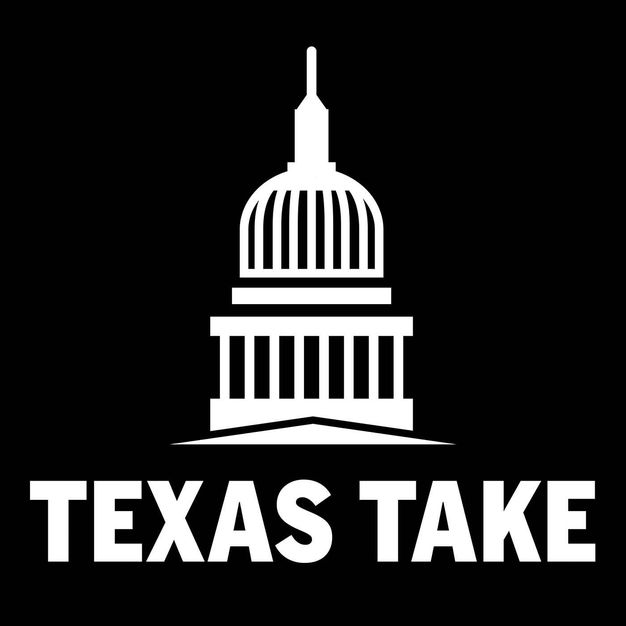 Texas Take
Texas Take
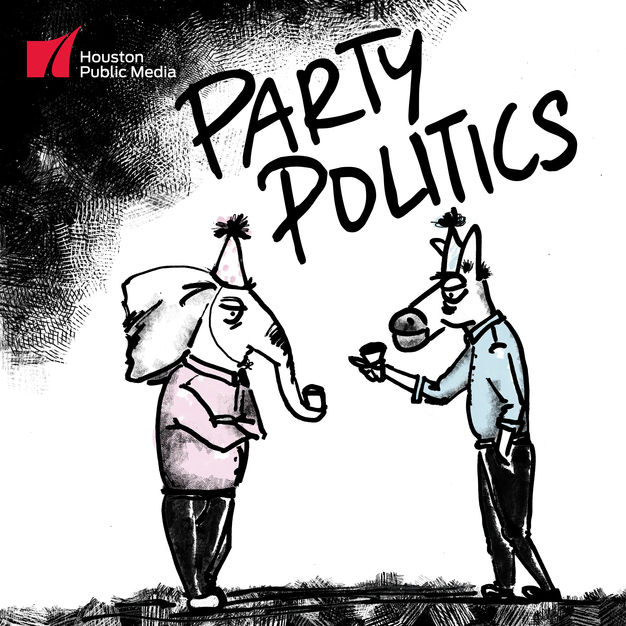 Party Politics
Party Politics
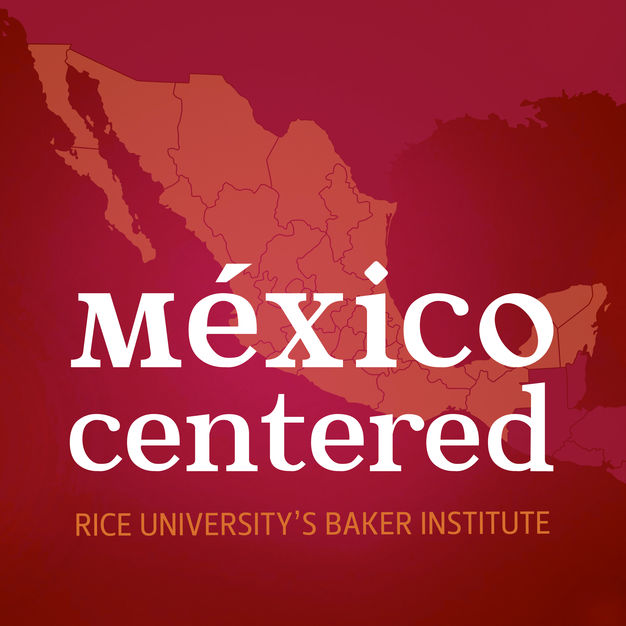 Mexico Centered
Mexico Centered
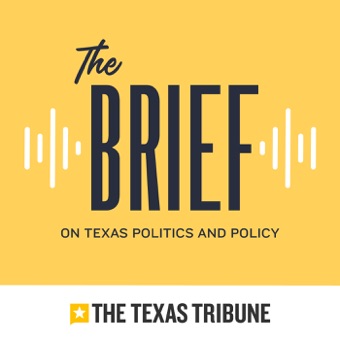 Texas Tribune Brief
Texas Tribune Brief
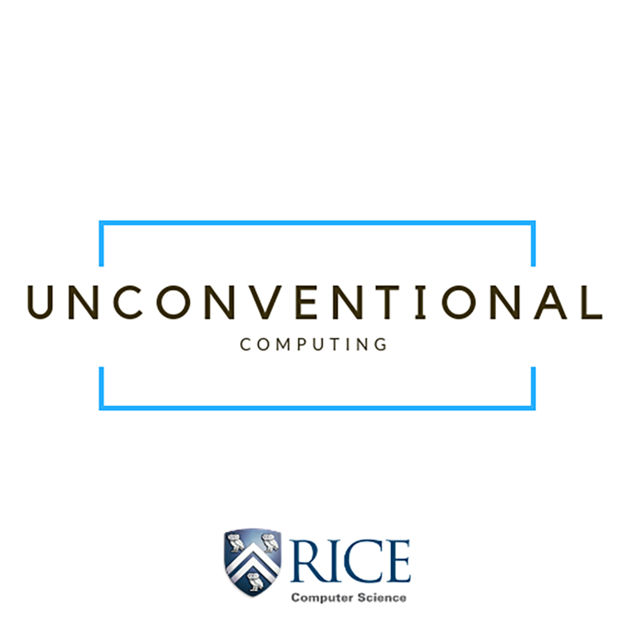 Unconventional Computing
Unconventional Computing
 Houston Matters
Houston Matters